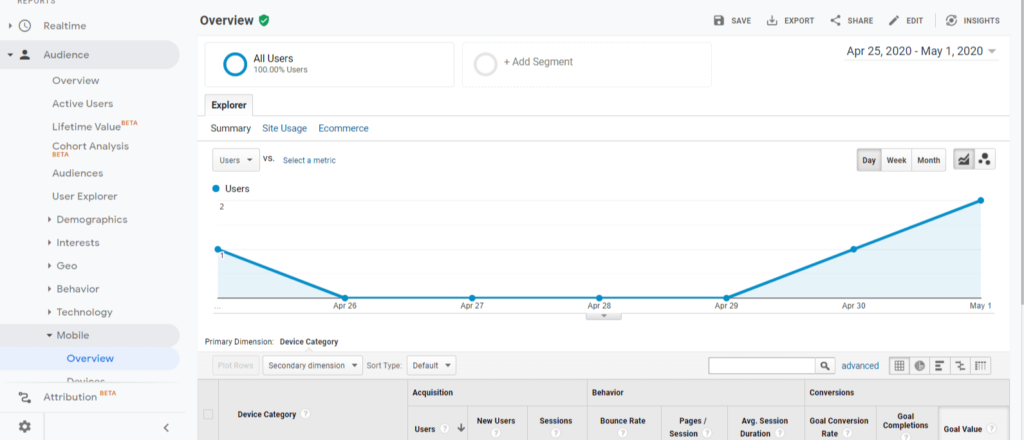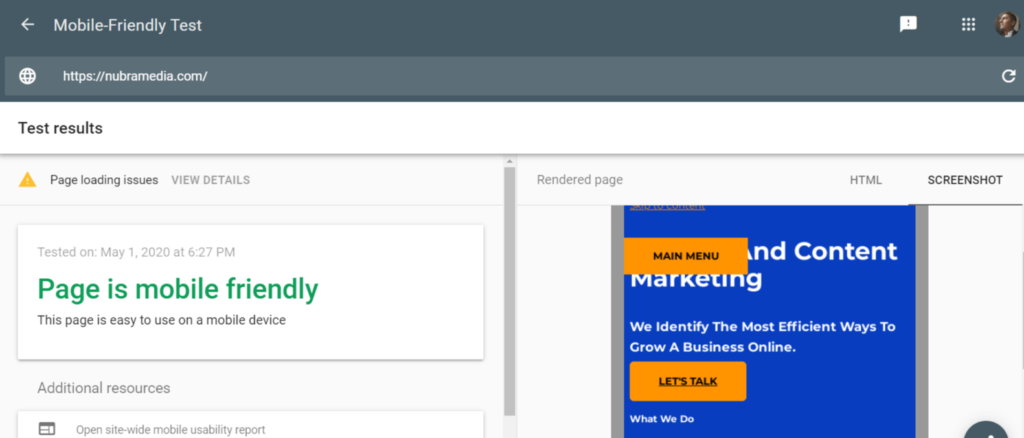It is becoming very important for every business to have a mobile-optimized website. The world is already adapting to the mobile-first approach. I am sure you don’ want to miss out on mobile users, who end up bouncing off your website due to poor user experience.
Why you need Mobile SEO for your website?
- Mobile searches have exceeded desktop and tablet searches.
- Google switched to the mobile-first index to rank websites in SERPs.
- Mobile Content helps determines the rank of a web page in SERP.
- 40% of users prefer to use mobile devices to complete the whole shopping process.
- Mobile SEO affects voice search. 62% of businesses still operate websites without voice search optimization.
So, are you interested to know more about the performance of your website on mobile devices?
How to check mobile traffic on your website?
Start using Google Analytics if you haven’t used it till now. It is one of the best free website analysis and reporting tool. You can track the mobile users’ behavior, bounce rate, avg time spent on the website, and a lot more. Here is the link to Google Analytics. Once you have installed, go to the dashboard, Under Audiences>> Mobile. You will find all the mobile stats in one place.

google-analytics-for-mobile
How to Check if your website is mobile responsive or not?
Google’s mobile-friendly test tool will help you find out the performance of your mobile site. This is one of the best free tools available. To check the sitewide mobile performance report, install google search console.

How to Check if Google can crawl the mobile version of your website?
If you don’t have your website verified with Search Console, please do that first. Go to Google search console. Under Crawl>Crawl Errors>Smartphone, you can check the status.
All the tools mentioned above will help you check the mobile performance of your site. Once you have the report, it’s time to optimize the website for mobile SEO.
How to Optimize Mobile User Experience?
1) Improve the bounce rate of the website. High bounce rate means users are not getting what they wanted out fo their website. It might be the information on your website or they didn’t like the user experience. Analyze your website on Google analytics to find out the reason behind the high bounce rate.
2) Improve website loading speed: 53% of visits bounce off if the site takes 3+ seconds to load. Better you have it around 1-2 seconds. To check the speed of your website on mobile devices and networks, click here.
You can also use Google Page Speed Insight and GTMatrix to check the mobile speed of your website.
Some quick measures you can take to improve the loading speed are:
- Compress images: You can use image compression tools available online.
- Minify CSS and JS code files
- Use Caching to serve page, as that helps with the speed.
Learn more about the factors affecting the page load speed of a website and how to fix it.
Hire an expert, if you are finding it difficult to optimize your website speed.
3) Make your website responsive, that renders on all devices and screen sizes. Create a seamless user experience for different devices such as tablets, desktops, smartphones. According to Google, 63% of users expect a seamless experience, but 42% believe they get it.
4) If you are using popups, make sure they are mobile compatible. Avoid using 0-second popups. That is a bad user experience for mobile users.
5) Mobile Content Optimization is crucial. Optimize title tags, meta descriptions for mobile screens. The length of meta tags on mobile screens is less as compared to the desktop, due to less real estate. Use keywords that people often use while searching for something on their mobile. For e.g. Dentist near me, Best Indian Restaurants in Florida. Choose the right keywords for your web pages content as well. Add social sharing buttons with open graph tags.
80% of social media time gets logged on mobile devices. People share content on Facebook messenger, Whatsapp, and Telegram. So, have widgets for these services on your mobile website.
6) Add a sitemap to your website. It is important for mobile and desktop SEO. It helps search engines crawl and index your website pages. An XML sitemap is a good choice.
7) Get SSL certification for your domain. HTTPS domains get priority in SERPs over HTTP domains. SSL power websites are secure. People prefer to share their personal information and confidential data over secure servers. So, better you get SSL installed on your website.
8) Use Heading tags such as H1, H2, H3..H6 to define content hierarchy on your webpages. Include the main subject of your content in Heading tags. Use your target keywords as well. This helps search engines find out the subject of the web pages.
9) Use Schema markups, so that Google knows what type of content is on your website.
10) Use Accelerated Mobile Pages. AMP concept has been in existence for a long time. But Google has not modified its algorithm for such pages. There is a high probability, that in the coming future, AMP pages will get preference in mobile SERPs.
11) Voice search optimization. As per a study done by Comscore, half of all the smartphone users used voice search. Also, one-third of mobile users, do it daily. To optimize your mobile website for voice search, you need to follow these basic things:
Use LSI Keywords: LSI stands for latent semantic indexing. It is a system used by search engines to analyze the keywords people use related to a certain topic. LSI keywords are words and phrases with a higher degree of correlation to your target topic. It is to determine the content quality and relevance to the search term.
Google search quality rating for voice search( eyes-free voice assistant) focus on:
- Answering the questions completely or delivering the right information for the searched query.
- Having answers that are of the right length to answer a query.
- Having formulated answers, optimized for answer boxes, and featured snippets.
- Use questions as a subheading in your web page content.
- Include lists and tables in the answers.
Conclusion: It is the right time to take action. Check your website’s mobile performance following the above-mentioned points. Hire an expert to get your website’s mobile SEO fixed.
